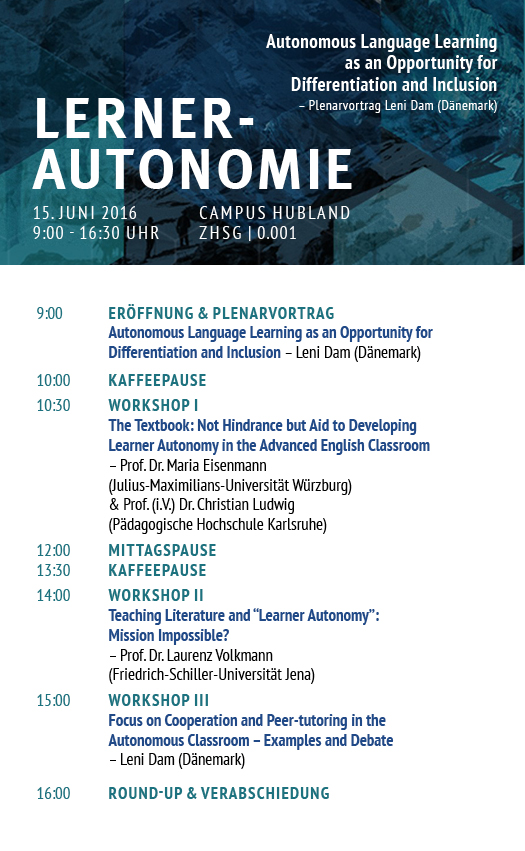1. TEFL DAY 2016: "Lernerautonomie"

Die Teilnahme an den Workshops ist nur mit vorheriger Anmeldung möglich!
Ansprechpartner: Prof. Dr. Maria Eisenmann
maria.eisenmann@uni-wuerzburg.de
Autonomous Language Learning as an Opportunity for
Differentiation and Inclusion
– Leni Dam (Dänemark)
“We call upon all governments and urge them to give the highest policy and budgetary priority to improve their education systems to enable them to include all children regardless of individual differences or difficulties.” (Salamanca statement, p. ix)
The talk will begin by outlining some basic principles, procedures and tools involved in autonomous language learning. The aim is to show that autonomous classrooms cater for all learners regardless of individual differences or difficulties. This means, for example, that the type of activities introduced is determined by the need or requirement that all learners can take part in and profit according to their diverse abilities (differentiation and in inclusion).
The illustrative examples are taken from learners' logbooks, the teacher's logbook, and also derive from classroom data. They were collected in a Danish comprehensive school. Qualitative data of this kind will be complemented by statistical data from a research project in which the linguistic development of autonomous learners was systematically observed over a period of four years (cf. LAALE - Language Acquisition in an Autonomous Learning Environment). The talk will conclude by addressing some do's and don'ts in connection with inclusive pedagogy.
The Textbook: Not Hindrance but Aid to Developing Learner Autonomy
in the Advanced English Classroom
– Prof. Dr. Maria Eisenmann (Julius-Maximilians-Universität Würzburg);
Prof. (i.V.) Dr. Christian Ludwig (Pädagogische Hochschule Karlsruhe)
The autonomous approach advocates greater emphasis on the learners in all steps of the learning process. Yet, while many teachers and learners show interest in autonomous language learning, they are often reluctant when it comes to implementing principles of learner autonomy in their own classrooms. In the German context, there are many reasons for this, such as constraints of educational standards, curricula, central exams, and, very often most prominently mentioned, the textbook. The aim of this workshop is to show that learner autonomy provides a successful framework for environments in which learners are encouraged to develop individual relationships with their learning. Proceeding from the assumption that textbooks present one of the most common materials in the foreign language classroom, in the first part of the workshop we will briefly focus on the complex relationship between learner autonomy and the textbook. The major part of the workshop will then be of a more practical nature. Participants will be given the opportunity to explore different textbook activities. Due to the variety of English textbooks currently used in Bavarian schools and in order to have a common basis for discussion, the workshop will be based on Green Line New (Ausgabe Bayern, 7. Klasse). We will discuss the opportunities textbook materials give students to make their own individual and differentiated choices about what or how to learn within the book and how approaches, methods and activities frequently suggested in textbooks can be used as a starting point for successfully developing learner autonomy in the modern differentiated English classroom.
Teaching Literature and “Learner Autonomy”: Mission Impossible?
– Prof. Dr. Laurenz Volkmann (Friedrich-Schiller-University Jena)
Admittedly, implementing the concept of learner autonomy in the case of “teaching literature” does not exactly sound like it could work well. A hesitant and slightly reluctant learner myself when it comes to “learner autonomy”, I see this visit to Würzburg as a good opportunity to probe the chances and limits of such a student-centered approach in a workshop-like presentation. First, I would like to present some of the guidelines of learner autonomy with regard to their possible advantages in the case of teaching literature. Then I would like to discuss with my audience whether and how these principles can be put into practice when it comes to using both analytical and productive (creative) approaches to literature. We will then continue, in the spirit of autonomous learning principles, with group work, in which the material can be (partly) chosen (“work choice”). You will also be free to choose teaching and learning methods (preferably involving “peer tutoring”), teaching/learning goals and ‘output’ (“free choice of product”). We will continue by asking ourselves how far this approach changes the teacher’s role with her or him becoming “the guide on the side”, offering a “clear structure” for the learning process. This group-work activity, hopefully, will result in a number of teaching plans for a variety of texts – which will be put under scrutiny concerning their efficacy and practicability. I am looking forward to a stimulating teaching and learning experience.
Focus on Cooperation and Peer-tutoring in the Autonomous Classroom –
Examples and Debate
– Leni Dam (Dänemark)
“The more the student becomes the teacher and the more the teacher becomes the learner, then the more successful are the outcomes.” (Hattie 2009: 25)
The aim of this workshop is to come up with possible ideas for cooperation and peer-tutoring in foreign language learning in general and in autonomous language learning in particular. The workshop will begin by presenting specific examples of cooperation and peer-tutoring in an autonomous learning environment, i.e. from Leni Dam’s classes. Based on these examples, the workshop participants will consider one or more of the following questions in smaller groups:
• Which types of cooperation and peer-tutoring do we already make use of?
• If the presented examples are new to you, can they be used in your context?
If yes, how so? If no, why not?
• Apart from Hattie’s example, which other advantages can you think of as a result of cooperation / peer-tutoring in autonomous language learning?
• Foreseen hurdles or problems in connection with cooperation and peer-tutoring?
• Other concerns?
The results from group work will be presented and collected in plenary and form the base for a debate around the topic of the workshop.


